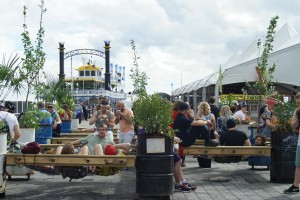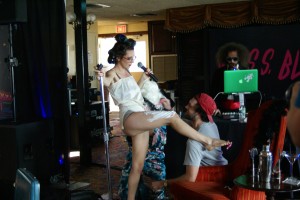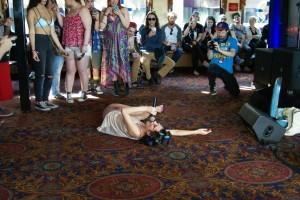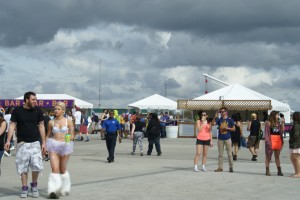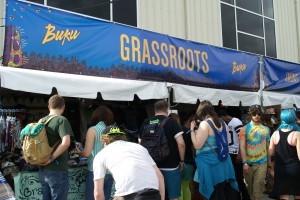The 2015 BUKU Music + Art Festival, held on the riverfront at Mardi Gras Zone, once again attracted legions of young EDM lovers from near and far for two days of high-profile electronic acts.
The crowd was packed with enthusiastic BUKU diehards (general admission tickets sold out at $100 a day and $180 for the weekend), and sometimes it was nearly impossible to fight through hordes of people.
With almost 60 acts divvied up between five stages over the course of the weekend, there was plenty of music to be seen.
Boyfriend put on a hilarious, promiscuous show for a small crew on the steamboat Friday, followed up by Big Freedia’s twerking lessons.
Passion Pit’s shiny pop groove from the Power Plant main stage was pleasantly danceable, and lead singer Michael Angelakos’ charisma lent him a compelling stage presence, but his thin vocals and weak falsetto were difficult to understand.
Bassnectar packed the Power Plant area after Passion Pit and took the energy level up about a billion notches, which comes as no surprise from the renowned, metal-inflected dubstep/drum and bass DJ.
He worked his laptop while headbanging wildly, looking miniscule against a backdrop of freaky, kaleidoscopic visuals with his face obscured by long, tangly-looking hair.
The laser light show was totally consuming, making for an entire set of full-on sensory overload.
Lil B delivered a solid, engaging set on the indoor Ballroom stage, but he had difficulty getting the crowd to chant along with his refrain of “I love New Orleans!”
With persistence, he eventually eased them into it by first getting them to declare their love to other things, including themselves.
The dark, packed, smoggy-feeling “Float Den” warehouse was where things got really rage-y, hosting acts like Die Antwoord, Flosstradamus, and Odesza.
Israeli “gorecore”/trap producer Borgore launched a set greeted with particular growls of enthusiasm, and it was hard not to get into the sweaty, riotous stomping that ensued.
Goofy Afro-Brazilian-percussion-inspired ensemble Bate Bunda wandered around outside on Friday afternoon, playing their signature unorganized-but-upbeat dance music.
The festival bills itself as an avant-garde/industrial “music and art project” that fuses mass pop culture and New Orleans underground culture, but the emphasis is definitely on the former.
There were some pop-up street performances and art installments – like the wall of live graffiti art, some body painting booths, and a hang-out structure called “Fort BUKU” – but none were as elaborate, “underground,” and/or as heavily-frequented as the advertising implied.
At any rate, it did sort of seem to have its own little cultural idiosyncrasies (with lots of hula hoopers, neon booty shorts and tank tops, and weird furry boots) and, as advertised, definitely preserved more of a “house-party vibe” than your standard big festival.
What did you think about BUKU 2015?

